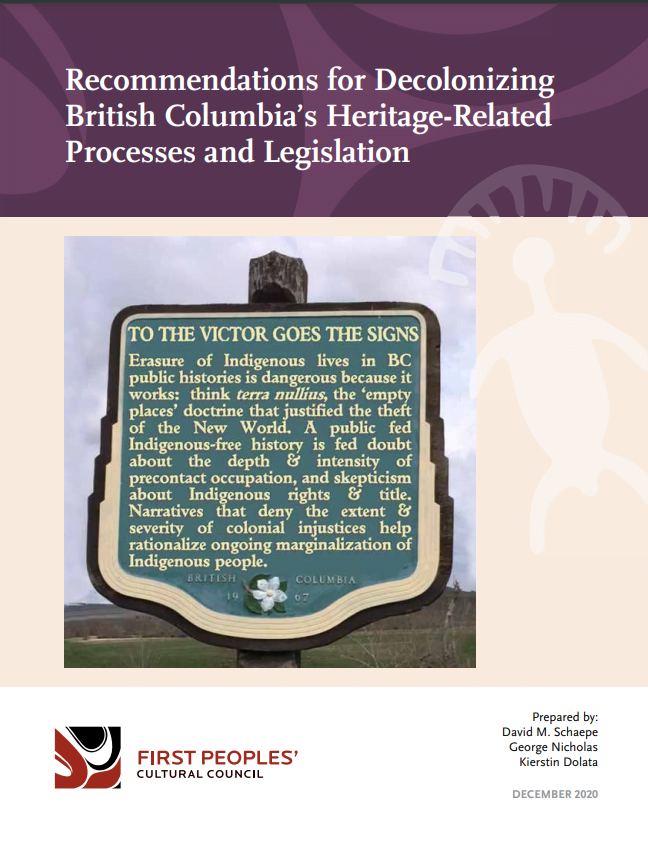10 search results
Recommendation 1:
Start by acknowledging that the cultural heritage of Indigenous peoples belongs to Indigenous peoples. Without exaggeration, 99.9% of archaeological sites in B.C., extending back in time more than 10,000 years, are those of Indigenous peoples. Yet Indigenous peoples have had little say in or control over decisions made concerning their study, preservation or destruction.
-
Category and theme:
Groups affected:
Recommendation 2:
Apply Call to Action 43 from the TRC as it pertains to each of the policies reviewed: 43. We call upon federal, provincial, territorial, and municipal governments to fully adopt and implement the United Nations Declaration on the Rights of Indigenous Peoples.
-
Category and theme:
Audience:
Groups affected:
Recommendation 3:
Establish jurisdiction and statutory decision-making authority over ICH by Indigenous peoples. This requires decentralizing power and developing or activating mechanisms for extending authority to Indigenous peoples. Shared decision-making processes and relations should be established in support of Indigenous peoples’ management of their own cultural heritage. B.C.’s current Bill C-41 / Declaration on the Rights of Indigenous Peoples Act (DRIPA) provides a mechanism for developing such legal mechanisms, processes and relationships. Provincial legislation needs to be amended to include UNDRIP, as is being planned for currently by British Columbia and the First Nations Leadership Council via an Action Plan. ICH management should be included as a priority item in B.C.’s DRIPA action plan.
-
Category and theme:
Groups affected:
Recommendation 4:
Identify and eliminate any influence of colonial doctrines, including the Doctrine of Discovery and terra nullius, on ICH and more generally.
-
Category and theme:
Audience:
Groups affected:
Recommendation 5:
Establish and enhance relational versus transactional connections between governments based on Indigenous rights recognition, government-to-government and/or nation-to nation foundations of equality, and through development and implementation of shared decision-making processes addressing ICH. This requires displacing the current standards of engagement/consultation/accommodation based on unilateral government decision making and strength of claim assessments, and replacing them with new standards as set out in point 3 above.
-
Category and theme:
Audience:
Groups affected:
Recommendation 6:
Apply holistic, integrated, fulsome and inclusive recognition of ICH, serving to broaden institutional attachments from the narrow focus on “archaeological” material culture currently common in the interpretation of the heritage legislation such as the Heritage Conservation Act.
-
Category and theme:
Audience:
Groups affected:
Recommendation 7:
In addressing Recommendation 6, recognize five key points from “Why Intangible Heritage Matters” (Nicholas 2014):
- Heritage protection and management remain focused on the tangible;
- However, no object or place has meaning without the intangible values ascribed;
- For Indigenous peoples, the tangible and intangible are often indivisible, which has substantial implications for heritage protection;
- A double standard exists regarding how Indigenous intangible heritage, including Traditional Knowledge, and Western Science are valued or treated.
- Efforts to decolonize heritage research and to implement such developments as the UNDRIP will continue to fail if intangible heritage is ignored.
-
Category and theme:
Audience:
Groups affected:
Recommendation 8:
Harmonize statutory and operational relations between provincial agencies such as the Archaeology and Heritage Branches of the Ministry of Forests, Lands, Natural Resources and Rural Development. This requires better communication and strengthened relations between provincial agencies dealing with ICH, including the Ministry of Indigenous Relations and Reconciliation as a key facilitator of relations.
-
Category and theme:
Groups affected:
Recommendation 9:
Harmonize relations between Canada and British Columbia in recognizing and addressing ICH to establish a more cohesive, holistic and integrated approach.
-
Category and theme:
Groups affected:
Recommendation 10:
Ensure that Indigenous peoples have the resources needed to develop and administer their own cultural heritage laws, policies and practices. Establish agreements that clarify relations with and between federal and provincial governments.
-
Category and theme:
Audience:
Groups affected:
